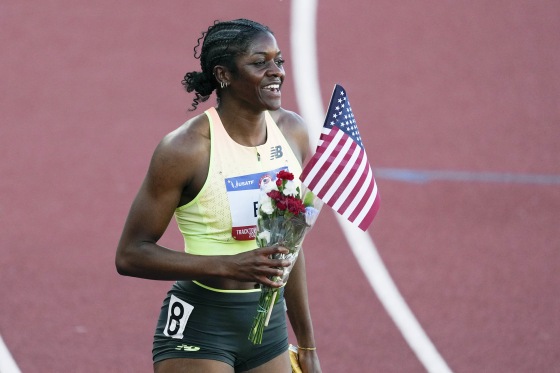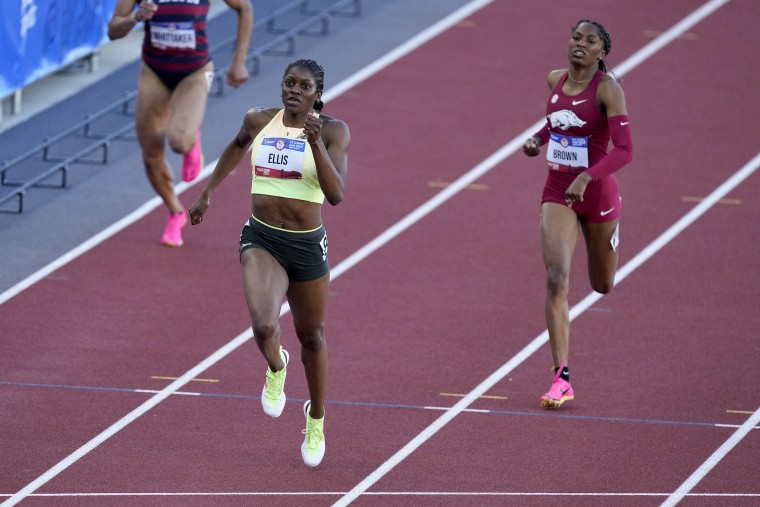In a personal essay, track and field star Kendall Ellis shares how she tackles anxiety head-on ahead of her races at the Paris Olympics.

Kendall Ellis won the women’s 400-meter final during the U.S. Track and Field Olympic Team Trials in June in Oregon — even after getting trapped in a porta-potty right before her race.Chris Carlson / AP
By
I’ve been in Paris for 12 hours and although it’s overwhelming, I’m excited. This is such a different experience than Tokyo, aka the COVID Olympics, where we were separated from each other with little social interaction. I’m approaching Paris with fresh eyes because it feels like the whole city is at my disposal. I’m taking a lot of pictures and soaking it all in because while one Olympics is cool, getting to my second is very special. I’m trying to make sure I enjoy every moment.
I’ve always been open about my struggle with anxiety, but right now, days before I compete, I don’t have any. I’m just excited. Once the realization creeps in that “Oh, I’m at the Olympics and this is a big deal,” I’ll start to feel expectations and pressures, but for now, I’m relaxing in the current moment.
My anxiety has different levels. The base level is jittery and on edge. Let’s just say I’m not the kindest person on race day. I can be touchy, sensitive and don’t like to talk much. When my anxiety gets worse and takes on a life of its own, it feels uncontrollable. My heart rate increases, I struggle to keep food down or even eat, or hyperventilate. When my anxiety manifests itself physically, that’s when I know I’ve got to reel it back in and use my coping mechanisms.
As a person of faith, I often turn to scripture, read my Bible and listen to podcasts and YouTube videos that bring me back to a calm sense of self. I turn to 2 Timothy 1:7, which says, “For God gave us a spirit not of fear but of power and love and self-control. For God has not given us a spirit of fear and timidity but of power, love and self-discipline.”
I’m big on journaling too. I write down scriptures and affirmations on paper so I can see them in front of me, making them tangible and concrete. I also use self-soothing techniques like placing one hand on my chest and one hand on my stomach while taking deep, slow breaths.
At the Olympic trials in June, races were late in the day and just sitting around watching YouTube made me antsy. But instead of tensing up, I started jumping on the bed to loosen up my legs and doing things that relaxed me and got me back into my body. When the anxiety shows up physically, I know I need to regain control. Things like jumping on the bed put me back in the driver’s seat.
But as it gets closer to race day, it’s a different story. I can be short-tempered or irritable. The smallest things can grind my gears — like if I’m getting too many texts or someone’s playing loud music. That’s how I know I’m anxious because those things would not bother me otherwise.
We’d be remiss not to discuss the porta-potty incident — when I got trapped inside one right before the qualifying semifinal — because even though I still can’t believe it, it did happen. As stressful as it was (getting trapped inside small spaces is my No. 1 fear!) —- thankfully it was one of the bigger stalls. After being trapped inside for 10 minutes, my heart rate was through the roof. I thought, “You’ve got to be kidding me, why am I trapped in a porta-potty 45 minutes before my race? This is so insane!” But oddly enough, it lightened my mood. (And, as a hilarious bonus: I now have a partnership with Charmin.)
Once I got out, I took a deep breath, looked in the mirror and said, “Kendall, you can’t get too worked up because if you get emotional, it’s going to affect your body and your race.” I had to stay level-headed and calm, and I was proud that I handled the incident with such self-control. In the past, I’ve let my anxiety take over and ruin races, so it made me proud to have the maturity to self-regulate and decide that I wasn’t going to let my emotions rob me of a personal record.

I don’t do any of this alone. I have a sports psychologist on call when I’m at a competition and reach out as needed because even though I’ve dealt with anxiety for so long, it never hurts to have a refresher when I’m so anxious I can’t think straight. I have tools but having another voice in the mix is invaluable. She’ll give me quick bullet points of coping mechanisms and say “Let’s get back to your mental training.”
At one point, I considered taking medication, but after meeting with the psychiatrist, I didn’t feel like there was a proper time to explore dosages and side effects since I had the upcoming 2023 World Championships, the 2024 Olympic Games and 2025 World Championships. I don’t know if there’ll ever be a right time. Part of me thinks there’s always a little bit of anxiety needed to perform because it means I care. It means I want great results. And I do.
I tell the young women I coach at Voice In Sport, an organization that guides female athletes as they turn pro, that the moment isn’t bigger than you — even in the case of the Olympics, the world’s biggest stage. It’s a huge deal and an accomplishment in and of itself, but I tell them, “You’re here for a reason, because you’re supposed to be here. You’ve earned your spot and are just as talented as anyone else in the field.”
I take this advice to heart because my coach tells me, “We never get too high and we never get too low.” I try not to let the wins boost me to an overly cocky state or let the lows define me as an athlete. I try not to give the moment — whatever it is — too much credit.
Relative Articles
None found





